<< Back
8 Days After a Pancreatic Cancer Diagnosis, This Man Had Surgery That’s Kept Him Cancer Free for 5 Years

November 03, 2022
Joseph Mele spent a year with digestive problems, feeling bloated, weak and listless, with no appetite.
But it only took eight days after his pancreatic cancer diagnosis to get the life-saving surgery that has kept him cancer-free for five years.
The surgery has helped Mele defy the odds. According to the American Cancer Society’s Cancer Facts and Figures 2022, the five-year survival rate for pancreatic cancer is 11%. And that’s actually an improvement – an increase of five percentage points over the last decade.
In 2022, an estimated 62,210 Americans will be diagnosed with pancreatic cancer. According to the report, while pancreatic cancer is currently the 10th most commonly diagnosed cancer in the U.S., it remains the third-leading cause of cancer-related deaths. Pancreatic cancer remains on track to become the second leading cause of cancer-related deaths before 2030. Approximately 49,830 Americans are expected to die from the disease this year.
Mele’s path to a diagnosis was made more complicated than most – an earlier bout with kidney cancer left him with only one functioning kidney, so doctors were unable to order contrast scans of his internal organs. A contrast dye used in a scan blocks X-rays and appears white on images, which can help show a tumor that might otherwise not be found.
All the endoscopies and CT scans he was having showed nothing unusual in his digestive tract or elsewhere. His gastroenterologist Jon Ernstoff, MD, was stumped. His stomach wasn’t emptying properly and they were unable to figure out why.
So Ernstoff referred Mele, a Meriden resident who was 66 years old at the time, to gastroenterologist Michael S. Karasik, MD, who performed an endoscopic ultrasound. With results in hand, doctors immediately admitted him to Hartford Hospital.
“I went home two months later. There was a tumor at the head of my pancreas,” Mele recalls. “It was like a boa constrictor wrapped around my duodenum (which is in the small intestine).”
He was so malnourished that he needed eight days of tube feeding and IVs before doctors felt he was strong enough for the surgery. Surgeon David Curtis, MD, performed a Whipple on July 3, 2017.
A Whipple — also known as a pancreaticoduodenectomy — is a complex operation during which the head of the pancreas, the first part of the small intestine (duodenum), the gallbladder and the bile duct are removed. Mele had already had his gallbladder removed in a prior surgery hoping to solve his digestive issues.
“Dr. Curtis came to see me, and there was a whiteboard in my room,” Mele said. “He drew a picture on the whiteboard of what was going on and what he would do. And the day the surgery was scheduled for, July 3, that was supposed to be his day off, but he came in and did the surgery.”
The day before the surgery, Curtis returned to Mele’s room for a conversation. “I had a tube down my throat from the minute they admitted me to feed me,’ Mele said. “Dr. Curtis told me, ‘I can’t tell you if this is curable or not. What I can tell you is, if it is curable, when you wake up that tube will be gone.’ And when I woke up I reached up and there was no tube. You don’t know how happy that made me.”
The surgeon removed the tumor and there were clear margins. Mele began a course of chemotherapy and radiation under the auspices of oncologist Uday Lele, MD. He finished his treatments in February of 2018, and in July 2022, he hit the coveted five-year mark.
Being able to have all his doctors within the same system, from his gastroenterologists to his surgeon and oncologist – and receiving his cancer treatments at a Hartford HealthCare infusion center was “perfect,” Mele said. “The network works great. I told my doctor, ‘I’m never moving because I can’t leave this medical practice’.”
Subsequent health challenges including a hernia and a bowel blockage that both needed surgery brought him to even more HHC specialists.
“I told them, next time just put in a zipper,” Mele said.